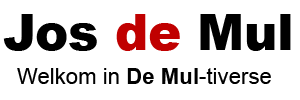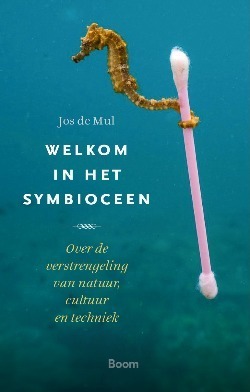Jos de Mul. Database Identity. Invited lecture at the Herrenhausen conference Society through the Lens of the Digital. Hannover, May 31-June 2, 2017.
New information and communication technologies are changing the very nature of human identity. In my talk, I will argue that they facilitate a change from narrative to a database identity. Narrative identity is what has traditionally defined people. A narrative identity can be complex, multilayered and dynamic, but it is strung out over a spatio-temporal continuum and has a certain logic and coherence through time. It forms a tissue of stories that makes a person, defining who she is. This narrative identity is being giving way, increasingly, to a database identity. With a database identity a person’s experience, qualities and characteristics all become entries in a database. These can be called up, assembled and re-assembled in never-ending set of combinations. Database identity is a post-modernization of identity. It is a playful pastiche of qualities and characteristics, decoupled from their context of origin and from their role in a person’s history.
Experts will discuss how the humanities and social sciences deal with the social challenges of digitization at the Herrenhausen Conference in Hanover from May 31 till June 2, 2017.
The perspectives of the social sciences and humanities on the digitization of society are the topic of this Herrenhausen Conference.
The Herrenhausen Conference "Society through the Lens of the Digital" explores the role of the social sciences and the humanities in a society saturated with debates on the effects of digitization: Parties, NGOs and the public sphere explore ideas of digital democracy. Luminaries of business try to map and unlock the potential of big data and of platform capitalism. Data journalists experiment with modes of describing the world not through linear texts but through algorithms and interactive visualizations while intelligent systems have to learn to navigate the often-ambiguous rules and structures of society. We're lacking scientific approaches to this multiplicity of discourses on digitization, which allow us to adequately explore its implications for research, research policy and the public role of the social sciences and humanities. The Herrenhausen Conference "Society through the Lens of the Digital" aims to fill this gap.
As a forum for debate between scholars and experts from civil society, politics, economy and journalism the conference will tackle questions such as: What role should the social sciences and the humanities play in the digitization of society? Which kind of answers are they expected to provide? How can they better fulfil their role as mediators and translators between the conflicting and sometimes even incommensurable perspectives on digital change? The discussion of theoretical, methodological and empirical tools thus is not only aimed at the further development of concepts and theories within the social sciences and humanities. Equally important is the question of how they can help the social sciences and humanities to open up to collaboration with the STEM fields and to help solve the grand challenges of digitization.
Herrenhausen Conference "Society through the Lens of the Digital"
May 31 - June 2, 2017
Herrenhausen Palace, Hanover, Germany
Organization
Prof. Dr. Armin Nassehi, University of Munich, Germany,
Florian Süssenguth, acatech, Germany,
Dr. Cornelius Puschmann, Hans-Bredow-Institute Hamburg, Germany
Program
The conference consists of ten sessions in which renowned experts analyse how digitization is reflected and made sense of in politics, the economy, media and science itself. A display of technological demonstrations offers an opportunity for exchange with scientists from STEM fields and developers, while young scientists will present their research in lightning talks, poster sessions and discussion groups. The program for the Herrenhausen Conference on "Society through the Lens of the Digital" can be found in the column on the right.
Our Conference Topics at a Glance
- Society through the Lens of the Digital - from Observation to Theory
- Radical Democracy or the Liquefication of all Collectivities? - The Political Teleologies of Digital Media
- Updating Social Criticism: Digital Capitalism and Digital Labour
- Society through the Eyes of Robots, Algorithms and AI
- Sources of Knowledge and Uncertainty: Coping with Digital Information Overload in Science and Business
- Identity in Times of Algorithms - Quantified Self and Gamification
- Observing the Digital World Society within Local Contexts
- Observing the World through Hermeneutics or through Algorithms? Data Journalism and Data Visualisation
- Implications of Changing Modes of Communication and Participation for Research and Research Policy
- Lightning Talks
Confirmed Speakers and Session Chairs include
Dirk Baecker (Witten/Herdecke, Germany), Michael Bültmann (Berlin, Germany), Andreas Diekmann (Zurich, Switzerland), Leonhard Dobusch (Innsbruck, Austria), Elena Esposito (Modena, Italy), Christian Fuchs (London, UK), Mary L. Gray (Bloomington, USA), Tom Holert (Cologne, Germany), Bernhard Kaufmann (Munich, Germany), Wilhelm Krull (Hanover, Germany), Deborah Lupton (Canberra, Australia), Laura Mann (London, UK), Sophie Mützel (Lucerne, Switzerland), Jos de Mul (Rotterdam, The Netherlands), Christoph Neuberger (Munich, Germany), Saskia Sassen (New York, USA), Ralph Schroeder (Oxford, UK), Michael Vassiliadis (Hanover, Germany), Shunya Yoshimi (Tokyo, Japan).
Registration
There are no fees for attendance but registration is essential. If you would like to attend the conference, please register by clicking on the registration link in the column on the right.
Language
The conference language is English.
Venue and public transport
The conference is held at Herrenhausen Palace, a modern conference center in Hanover, Germany. You can reach the venue by tram: Take line 4 or 5 and get off at "Herrenhäuser Gärten".
Accommodation for participants
Please note that you are responsible for booking your accommodation. As Hannover is a city that hosts many fairs, we recommend booking a hotel as soon as you register.
Cancellation
Please cancel your registration if you cannot attend the conference. We have a waiting list for the meeting and can offer your place to another person if you cannot attend. Simply use the registration tool to cancel or send us an email.
Herrenhausen Conferences
With its Herrenhausen Conferences the Volkswagen Foundation provides international experts as well as junior researchers with a platform for an intense interdisciplinary dialogue on exciting new areas of research and innovative methodological approaches. The main focus of the conferences does lie on the current challenges faced by each research area rather than on further in-depth discussions and analyses of individual well-established topics. We are interested in unanswered questions and unsolved problems - and in the respective research field's relevance for society.









